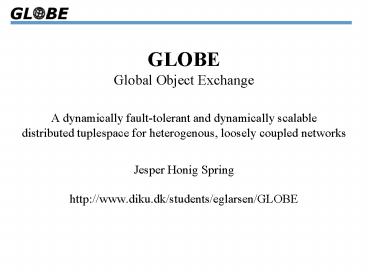GLOBE Global Object Exchange A dynamically faulttolerant and dynamically scalable distributed tuples
1 / 27
Title:
GLOBE Global Object Exchange A dynamically faulttolerant and dynamically scalable distributed tuples
Description:
distributed tuplespace for heterogenous, loosely coupled networks. Jesper Honig Spring ... Epidemic algorithm (Bayou), pair-wise reconciliation - slow! ... –
Number of Views:29
Avg rating:3.0/5.0
Title: GLOBE Global Object Exchange A dynamically faulttolerant and dynamically scalable distributed tuples
1
GLOBEGlobal Object ExchangeA dynamically
fault-tolerant and dynamically scalable
distributed tuplespace for heterogenous, loosely
coupled networksJesper Honig
Springhttp//www.diku.dk/students/eglarsen/GLOBE
2
Agenda
- The Tuplespace Paradigm
- Tuplespace Semantics
- Achieving Fault-tolerance
- Achieving Scalability
- Measurements of GLOBE
- Related projects
- Conclusion
- Demonstration and Questions
3
The Tuplespace Paradigm
- A communication paradigm (from 85)
- Communication unit
- Tuple ( Object)
- Tuplespace an
- intermediate container
- Tuples immutable in
- the tuplespace
- Implementations
- Linda, JavaSpaces, TSpaces etc.
4
The Tuplespace Paradigm
- Atomic Operations
- Insertion (out)
- Withdrawal (in, inp)
- Inspection (rd, rdp)
- Additional operations
- rdp/inp predecate
- Matching
- Templates (anti-tuple)
- Exact/Wildcard matching
- Tuple Type (null tuple)
- Tuple Field Values (wildcard fields)
5
The Tuplespace Paradigm
- Groupware
- Chat server
- Shared Blackboard
- High Performance Computing
- SETI_at_Home-like calculations
- Intelligent Connectionware
- Internet Services (internally in Jini LUS)
- Intelligent Home (TSpaces at IBM)
6
The Tuplespace Paradigm
- The Classical Problems with Centralized Systems
- Availability (Level of Fault-Tolerance)
- Single Point of Failure
- Scalability
- Cannot Scale beyond the Single Entity
7
The Tuplespace Paradigm
- Purpose of GLOBE
- Increase Availability (Fault-tolerance)
- Increase Scalability
- Dynamic Adjustment
- Distributed Tuplespace
- Abstraction
8
Operations Semantics
- Tuplespace Semantics vaguely defined
- Selection of matching tuple
- Arbitrary, FIFO, LIFO etc.
- Selection of process to withdraw tuple
- Concurrent withdrawals for same tuple
- Specified as fair
- In addition Issue related to distribution
- Predicate operations semantically unclear
- Inspect present state
- What is present state in a distributed
environment?
9
Operations SemanticsConcurrent and Distributed
Tuple Withdrawal
- Withdrawal operations must be performed
atomically! - Global ordering across replicas
10
Semantics of GLOBE
- Two Categories of Tuplespace Operations
- Strong Operations (in, inp)
- Weak Operations (out, rd, rdp)
- GLOBE adapts loose inp/rdp semantics
- Weak Operations are performed locally and any
changes (insertions) propagated later (depending
on the synchronization tightness). - inp/rdp may show false results!
11
Semantics of GLOBE
- Operation Ordering
- Strong Operations are Globally Ordered
- Weak Operations are Globally Unordered
- All Operations satisfy Partial Ordering
- S -- a sequence of tuplespace
operations performed on a replica
12
Achieving Availability (Fault-tolerance) and
limited Scalability by Replication
Number of replicas dynamically adjustable
13
Replica Update Protocol
- Active propagation
- Operations are persisted before propagation
- Replicas responsible for propagation
- Fast propagation
- Majority voting for all atomic operations
(tuplespace operations and configuration
operations) - Problem Not 100 reliable!
- Adjustability problem (removal of replica)
- Inconsistency in case of failure
14
Replica Update Protocol
- Anti-entropy
- Epidemic algorithm (Bayou), pair-wise
reconciliation - slow! - Replicas responsible for updating themselves
(pull-based to avoid duplicates) - Synchronization in case of failure
- Hybrid replica update protocol
- Combines Active Propagation and Anti-Entropy
- Ensures consistency convergence
15
Update Propagation
- Operation Buffer (FIFO)
- Operation Vector
- Logical Operation Numbers
16
Achieving Scalability by Partitioning (Partial
Replication)
Number of partitions dynamically adjustable
17
Tuplespace Partitioning
- Load balancing
- Resolution of tuple location
- Non-deterministic
- Deterministic
- Hash code
- Operation Redirection
- Problem Dynamic adjustment
- Complete rehashing of tuples
18
Dynamic Partitioning
- Partitioning by hash code
- Partition interval
19
Related Projects
20
Cost of Fault-Tolerance (Empirical)
- LAN-based measurements (16Mbps TR)
- 8 Pentium PCs
21
Gains of Fault-Tolerance(Theoretical)
- Assumes 5 failure probability
- Binomial distribution
- Dependent on the semantics
22
Cost of Scalability(Empirical)
- LAN-based measurements (16Mbps TR)
- 8 Pentium PCs
23
Gains of Scalability(Empirical)
- LAN-based measurements (16Mbps TR)
- 8 Pentium PCs
24
Conclusion
- Distributed Tuplespace Semantics is suitable
- Hybrid Replica Update Protocol is fast and
ensures consistency - Higher level of Fault-Tolerance
- Higher level of Scalability
- Fault-Tolerance and Scalability dynamically
Adjustable - Outperforms a highly loaded centralized Tuplespace
25
Future Work
- GLOBE enhancements
- Elimination/reduction of Redirection
- Load-balancing of Applications
- Implementation Optimizations
- Additional Tuplespace Features
26
Demonstration
- Implementation
- Java
- Jini
- JavaSpaces
27
Fault-Tolerance Scalability































